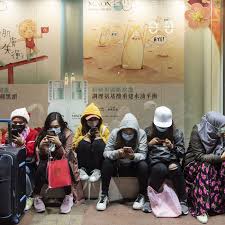
The new coronavirus bothering budgetary markets and inciting travel bans is taking on its very own existence on the web, by and by putting U.S.- put together web based life organizations with respect to the guarded about their endeavors to control the spread of bogus or risky data.
Scientists and columnists have archived a developing number of instances of deception about the infection, going from bigot clarifications for the sickness’ cause to bogus cases about supernatural occurrence fixes. Trick scholars, trolls and pessimists wanting to utilize the frenzy to help traffic to their own records have all added to the haze of terrible data.
“It’s the perfect intersection of fear, racism and distrust of the government and Big Pharma,” said Maarten Schenk, co-founder of the fact-checking site Lead Stories. “People don’t trust the official narrative.”
The epic coronavirus, which started in the Chinese city of Wuhan, has slaughtered 132 individuals and tainted more than 6,000, with cases in 19 nations.
One lot of tweets and Facebook posts from U.S. paranoid notion accounts said drinking dye could secure against the infection or even fix it. On YouTube, a progression of recordings blaming media associations for stifling data had a huge number of perspectives.
Actuality checkers, restorative specialists and scholastics evaluating coronavirus-related deception said probably the most popular fabrications have concerned immunizations that guarantee to forestall or fix the ailment and that would before long be monetarily open to the general population. In spite of the fact that restorative specialists and biotechnology organizations have started inquiring about and creating antibodies, they’re a long way from being loaded on drug store racks.
“Gossipy tidbits can travel more rapidly and more broadly than they could” in a period before web based life, said Thomas Rid, an educator of vital examinations at Johns Hopkins University, who has an inevitable book on the historical backdrop of disinformation. “That obviously fits connivances spreading all the more rapidly. They spread all the more broadly and they are increasingly tireless as in you can’t fix them.”
Mapping the Coronavirus Outbreak
A portion of the web traffic and falsehood has been by and large bigot against Chinese individuals and Asians as a rule. Presents crediting the coronavirus on Chinese culinary practices have exploded, and an audit of another Chinese eatery in Toronto was swarmed by bigot trolls.
“There’s a ton of falsehood out there, and a portion of that can be very risky,” Maria Van Kerkhove, leader of the World Health Organization’s rising sicknesses unit, said at a Wednesday question and answer session in Geneva.
Infections have consistently started dread and falsehood, striking frenzy as gossipy tidbits spread and individuals frantic for data lock onto whatever scraps they can discover – regardless of whether they’re valid or not. In any case, the appearance of online life has supercharged this procedure, prompting floods of deception over races, mass shootings, plane accidents and cataclysmic events.
The episode is only the most recent trial of interpersonal organizations’ capacity to deal with the spread of bogus and hazardous data.
Twitter Inc. is attempting to fight off awful data identified with coronavirus by guiding clients to progressively dependable sources, inciting clients who look for “coronavirus” to visit the Centers for Disease Control and Prevention site. The organization has not seen an uptick in disinformation since coronavirus turned into an overall issue, a representative said. Twitter has a strategy against individuals attempting to “misdirect” others with “tricky action.”
Facebook Inc’s. reality checking accomplices – autonomous associations that banner tricky posts on the stage – have been marking deception about the coronavirus so clients know it’s bogus, as per an organization representative. Facebook is additionally alarming individuals who may have shared deception before it was reality checked. On Tuesday, Facebook scans for “coronavirus” and related terms surfaced for the most part dependable reports from destinations , yet there were likewise connects touting questionable invulnerable boosting administrations and posts from clients that addressed whether the infection news was a scheme from the World Health Organization.
Data partook in private gatherings are outside of Facebook’s reality checking device, and they have been known to hatch connivances on a wide range of subjects.
Letters in order Inc’s. Google scans for the infection are topped with an exceptional board connecting to the Centers for Disease Control.
On Google’s YouTube, coronavirus was being treated as a news occasion, so looks for recordings identified with the flare-up for the most part returned outcomes from enormous, standard news associations, however some paranoid fear recordings sneaked past. A great part of the questionable data being shared could be viewed as what YouTube marks “marginal” content. That is data that isn’t really off-base or bigot however sells unverified schemes or disgraceful medicinal data. YouTube said its calculations are worked to bring down the occasions “marginal” content is prescribed to watchers.
In China itself, where homegrown web based life applications like WeChat and Weibo command, deception has spread nearby fights against the administration’s treatment of the circumstance. For the most part, online life is firmly checked and controlled by the socialist party. Be that as it may, the sheer measure of posts censuring the administration and requesting more activity mean some have sidestepped controls. Recordings and posts that in any case wouldn’t have left China have coursed through the web, giving the world a view into the circumstance that isn’t completely constrained by the legislature.
“Early days in an outbreak, there’s so much uncertainty. People don’t like uncertainty. They want answers,” said Timothy Caulfield, a health law professor at the University of Alberta.
“Social media is a polarization machine where the loudest voices win,” he said. “In an outbreak, where you want accurate, measured discourse, that’s kind of a worst-case scenario.”
Disclaimer: The views, suggestions, and opinions expressed here are the sole responsibility of the experts. No journalist was involved in the writing and production of this article.
